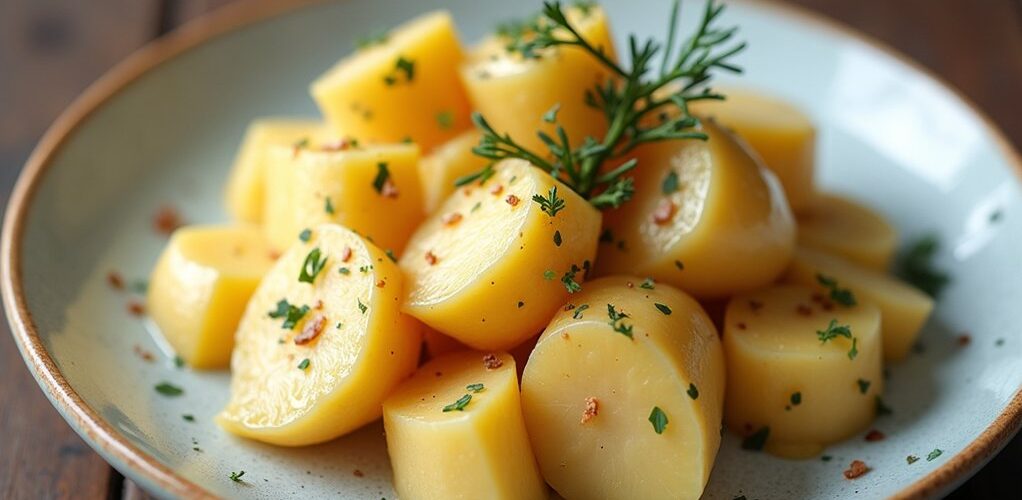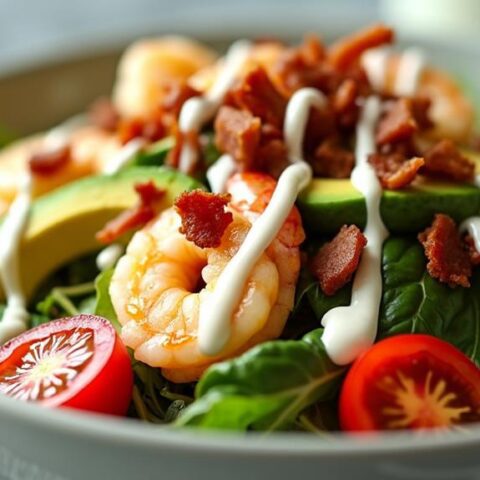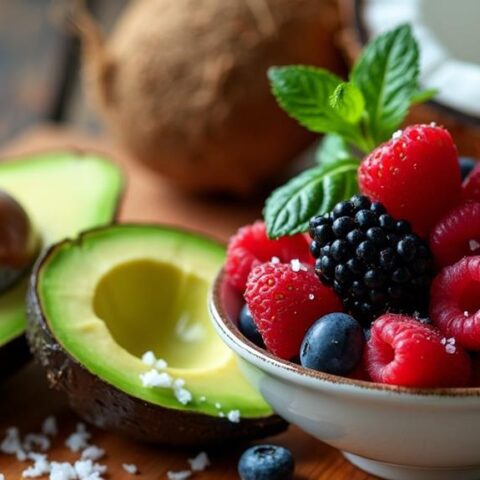
Rutabagas occupy a middle ground in the root vegetable carbohydrate spectrum, containing 6.32 grams of net carbs per 100 grams. While higher in carbs than radishes and turnips, they provide a lower-carb alternative to potatoes and parsnips, making them suitable for moderate carb-conscious diets. Their glycemic index of 72 necessitates portion control, but proper preparation methods and food pairings can optimize their place in a balanced eating plan. Understanding their versatility and nutritional profile reveals their full dietary potential.
Key Takeaways
- Rutabagas contain 6.32 grams of net carbs per 100g serving, making them a moderate-carb vegetable suitable for most low-carb diets.
- They have significantly fewer carbs than potatoes, making them an excellent substitute in low-carb meal planning.
- Their glycemic index of 72 means portion control is important for maintaining stable blood sugar levels.
- Rutabagas can be prepared through steaming or roasting while maintaining their low-carb benefits and nutritional value.
- One cup contains approximately 12 grams of carbohydrates, requiring careful portioning on strict low-carb or keto diets.
Understanding Root Vegetables and Their Carbohydrate Content
While root vegetables have long been a staple in global cuisine, understanding their carbohydrate content is vital for modern dietary planning.
Root vegetables, particularly rutabagas, grow beneath the soil and pack notable nutritional benefits, including vitamin C and potassium. When examining carbohydrate content, rutabaga contains approximately 12 grams per cup, with net carbs of 6.32 grams per 100 grams, making it a moderate-carb option compared to potatoes.
For those following a low-carb or keto lifestyle, it's important to note that rutabagas can consume nearly one-third of the daily carb limit on strict plans.
With a glycemic index of 72, these vegetables can greatly impact blood sugar levels, requiring careful portion control despite their valuable nutrient profile.
The Nutritional Profile of Rutabagas
As a nutrient-dense root vegetable, rutabaga offers a compelling nutritional profile that makes it a valuable addition to a balanced diet.
With just 157.0 kJ of energy per 100-gram serving, this low-calorie root vegetable contains approximately 6.32 grams of net carbs, making it suitable for those following low-carb eating plans.
Rutabaga's nutritional strength lies in its vitamins and minerals content, particularly its impressive 305.0 mg of potassium and 25.0 mg of Vitamin C per serving. These nutrients support essential bodily functions, immune health, and skin integrity.
For those monitoring their dietary intake, rutabaga's minimal total fat content of 0.16 grams and moderate sugars at 4.46 grams make it an excellent choice for balanced nutrition.
Comparing Rutabagas to Other Common Root Vegetables
Root vegetable enthusiasts seeking low-carb alternatives can benefit from understanding how rutabagas stack up against their common counterparts.
With 6.32 grams of net carbs per 100 grams, rutabagas offer a middle-ground option among root vegetables, containing more carbohydrates than radishes and turnips but considerably less than parsnips and sweet potatoes.
While rutabagas provide a sweeter flavor profile than turnips, they remain a viable choice for those monitoring their carbohydrate intake.
When compared to celeriac's 9.2 grams of net carbs, rutabagas present a slightly lower-carb alternative with distinct taste characteristics.
For those following a keto diet or low-carb eating plan, rutabagas can serve as a moderate substitute for higher-carb options like potatoes, though portion control remains essential for maintaining ketosis.
Rutabagas, being non-starchy, are part of the keto-friendly vegetables list that support nutrient intake without disrupting low-carb goals.
Best Practices for Including Rutabagas in a Low-Carb Diet
Since rutabagas occupy a middle ground in the carbohydrate spectrum of root vegetables, incorporating them into a low-carb diet requires strategic planning and portion control. With 6.32 grams of net carbs per 100 grams, careful monitoring of daily carb intake becomes essential to maintain ketosis. Consider consulting with healthcare providers to tailor dietary choices that align with your health goals and lifestyle preferences.
| Strategy | Benefits | Considerations |
|---|---|---|
| Portion Control | Manages carb intake | Limit to 100g servings |
| Food Pairing | Balances blood sugar | Combine with lean proteins |
| Substitutions | Reduces total carbs | Use low-carb alternatives |
To mitigate the high glycemic index of rutabagas, combine them with fiber-rich foods in balanced meals. Consider substituting with lower-carb alternatives like cauliflower when necessary, particularly if following a strict ketogenic diet where moderation is paramount.
Cooking Methods to Maximize Rutabaga's Low-Carb Benefits
Maximizing the low-carb potential of rutabagas requires careful attention to cooking methods that preserve their nutritional benefits while enhancing their natural flavors.
Steaming emerges as a superior cooking technique, retaining more nutrients compared to boiling while maintaining the vegetable's low carbohydrate content.
Roasting rutabagas at 425°F capitalizes on their natural sugars through caramelization, creating a sweeter profile without compromising their low-carb status.
When incorporated into soups or transformed into a mashed alternative to potatoes, rutabagas offer versatility while keeping carbs in check.
The addition of herbs and spices during preparation further enhances their adaptability in low-carb cooking, making these root vegetables an excellent choice for health-conscious meal planning.
Frequently Asked Questions
Can You Eat Rutabaga on a Low Carb Diet?
Rutabaga can fit into low-carb diets when portion sizes are carefully monitored. Its nutritional benefits complement meal planning, though serving suggestions should limit consumption to maintain carbohydrate restrictions within daily dietary goals.
Is Rutabaga a Root Vegetable?
Rutabaga is definitively a root vegetable, growing underground with its edible bulbous root. Its nutritional profile, storage capabilities, and cooking versatility make it a valuable alternative to potatoes in many recipes.
What Are the Lowest Carb Root Vegetables?
Radishes, jicama, and celery root rank among the lowest-carb root vegetables, making excellent potato alternatives. These vegetables contain considerably fewer carbs than sweet potatoes, parsnips, carrots, turnips, and beets.
What Has Less Carbs, Turnip or Rutabaga?
Turnips contain fewer carbs at 4 grams per 100g compared to rutabaga's 9.8 grams. Their distinct flavor profiles and nutritional benefits make turnips the preferred choice for low-carb dietary considerations.
Conclusion
Rutabagas emerge as a viable option for those following a low-carb lifestyle, containing considerably fewer carbohydrates than potatoes and other starchy root vegetables. With proper portion control and cooking methods, they can be effectively incorporated into keto and low-carb meal plans. Their versatility in the kitchen, combined with their rich nutrient profile and relatively modest carbohydrate content, makes rutabagas a smart choice for health-conscious individuals seeking root vegetable alternatives.










No Comments